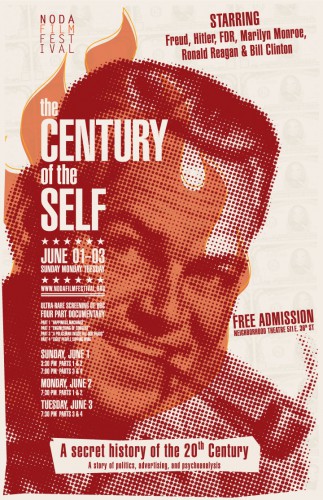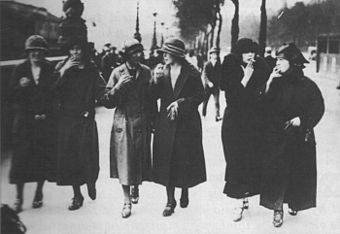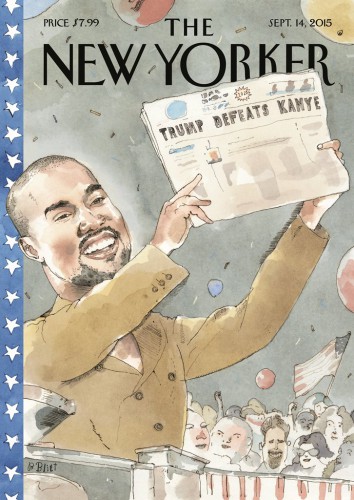
“The Century of the Self” is a fascinating and frightening account of changes in human behavior during 20th century. This 2002 BBC Documentary, directed by Adam Curtis, unfolds with the genesis of the Public Relations field, when the first PR firm was founded after WWI by a nephew of Sigmund Freud’s who believed his uncle’s theories about the unconscious mind and subconscious motivations could be leveraged to sway people in specific, desirable ways. The film then describes the unimaginably vast consequences that can be traced to this event, building an argumentative chain that links so many events in such lockstep as to make any viewer wonder how the connections had never been pointed out to him or her before. I found this piece to be not simply eye-opening, but downright earth-shattering.
As a quick refresher on the relevant Freudian theories: Sigmund argued the human mind is composed of at least three forces working in mutual opposition. The “id” (Latin for “it”, with all its beastly implications) is the constant, childlike demand for pleasure and gratification. We are born with this impulse into a world that seeks to constraint it. The next component is the mechanism of that constraint: the “superego” (loosely translated from Latin as “over me”) is the voice of the parent, telling the id what to do and what not to do so frequently that the voice eventually sets up camp and shouts “No!” before the id can get into trouble. The superego’s constraint of the id ideally creates a functional adult out of a whining baby, resulting in the third component of mind. This component, the “ego” (meaning “I” in Latin), is the healthy adult who balances interior needs with exterior demands. Personality, then, is a product of an armistice between an internal hedonist and an external terrorist.
 If this model seems farfetched, imagine yourself in therapy. “Doctor,” you say, “I really want to leave my husband, but divorce is wrong.” “Hmm,” the therapist replies. “Who told you divorce is wrong?” Your desire to end your marriage comes from your id. The voice in your head of your Catholic upbringing refusing to grant yourself permission for the divorce is the superego. The decision you finally make, balancing the concerns of the id and the superego, is an action by your ego.
If this model seems farfetched, imagine yourself in therapy. “Doctor,” you say, “I really want to leave my husband, but divorce is wrong.” “Hmm,” the therapist replies. “Who told you divorce is wrong?” Your desire to end your marriage comes from your id. The voice in your head of your Catholic upbringing refusing to grant yourself permission for the divorce is the superego. The decision you finally make, balancing the concerns of the id and the superego, is an action by your ego.
Ideally in a healthy society, each of us should interact with one another via healthy ego functioning. This is not always the case, however. Obnoxious people who want to be on Reality TV are displaying only their id, whereas moralizing people who want to control others are functioning in their superego. Some people have ids that aren’t fully controlled by a dominant superego, and other people have superegos so overpowering that they crush the joy from their own lives. While these terms are all modern and clinical, St. Paul might have understood the id as “the flesh” and the superego as “the law”. That the law cannot compel the flesh might have been his way of explaining the sinful “acting out” that characterizes most of our lives. With this framework, we can return to the documentary.
The first truly revolutionary PR campaign sought to encourage women to smoke. Smoking in public was considered unsavory for women, and the cigarette companies knew that half their market was therefore not buying. Executives approached Freud’s nephew, who paid debutantes to march with cigarettes in the 1929 New York Easter Parade. He positioned photographers along the route to shoot them, and he told reporters the girls had lit “Torches of Freedom” in an effort to stir controversy and make headlines. When the girls appeared in the papers the next morning, the public was outraged. But by claiming their smoking was an effort to demand woman’s rights, he assured that anyone who heard the story would have to pit their outrage about a social convention against their commitment to freedom. With this one effort he made women’s smoking socially acceptable, and overnight sales of cigarettes to women skyrocketed.

Such successes of public relations in America caught the attention of Hitler and Himmler in Germany. Himmler modeled the Nazi propaganda office on the New York PR firms’ business models, and he leveraged their insights to incite such id-driven fear and hatred within the German population as to make the Holocaust possible.
Cleaning up after the Nazis convinced Eisenhower and other prominent Americans that humans were driven by subconscious evil and that a mass genocide could break out in the US, too, if the population were not deliberately steered away from it. As a result, funding of research and programs in the 1950s and 1960s focused entirely on strengthening the collective superego and ensuring that all Americans behaved sociably. Public moralizing like the McCarthy Hearings were writ-large examples of this super-ego run wild. After all, with the Soviets looking over our shoulders, survival depended on control.
 The social chaos of the late 1960s was the invariable blow-back to this overreach. Baby Boomers had been raised in this environment of artificial oppression, so they naturally developed a culture of rebellion in response. (Because Freud thought of the mind as “hydraulic”, any pressure exerted in one place will necessarily result in changes elsewhere. An overburdened id will eventually rebel as surely as a ball tossed up will fall.) When this rebellion was justified by increasing evidence that the voice of the superego could not be trusted, the American ego began to break loose. Watergate was the nail in the coffin: when it is shown that the President himself is a liar and a cheat, then “authority” as a concept is emptied of real meaning. “You can’t be trusted to tell me what to do, so I will do exactly what I want.” Sinatra added “My Way” to his repertoire in 1969.
The social chaos of the late 1960s was the invariable blow-back to this overreach. Baby Boomers had been raised in this environment of artificial oppression, so they naturally developed a culture of rebellion in response. (Because Freud thought of the mind as “hydraulic”, any pressure exerted in one place will necessarily result in changes elsewhere. An overburdened id will eventually rebel as surely as a ball tossed up will fall.) When this rebellion was justified by increasing evidence that the voice of the superego could not be trusted, the American ego began to break loose. Watergate was the nail in the coffin: when it is shown that the President himself is a liar and a cheat, then “authority” as a concept is emptied of real meaning. “You can’t be trusted to tell me what to do, so I will do exactly what I want.” Sinatra added “My Way” to his repertoire in 1969.
The 1970s are characterized in our memories by kitsch. Bell-bottom jeans. Sideburns. Disco. The financial stress engendered by the oil embargo at the end of the decade required full application of the remaining superego: face rationing with a stiff upper lip! People were already tired and angry, and this was the last straw. Personal restraint completely fell apart during the Carter administration, prompting the President to go on television and claim the country faced a moral crisis. He was right.
In response, Ronald Reagan did something truly remarkable. A washed-up actor who still knew how to play to his audience, the old Hollywood star dressed up the childish id with the finesse of Cary Grant. Put on a tie and call your selfishness “profit motive” and suddenly you’ve become Alex P. Keaton. The NeoCons of this era knew implicitly that Freud’s theories were right: people wanted to unleash their id, but they needed to do so while passing under the radar of the superego. Hippies from the 1960s had dressed to stand out, but if you could look socially-responsible while letting your id take control, you could be as selfish as you wished and call it “personal liberty”. Torches of Freedom, indeed.
Thereafter, the Democratic Party floundered for years, still preaching ideas about public responsibility and the social contract. These are all superego ideas, however, and no one was listening any longer. Clinton managed to defeat Bush Sr. in 1992 by appealing to id-driven anger about the Bush Tax Increases. But Clinton learned a hard lesson when his reform proposals were obliterated by the “Conservative Revolution” led by New Gingrich in 1994. After seeking guidance from a PR firm, Clinton switched tracks and started deliberately appealing to voter’s ids. He gave up on a consistent platform and championed one-off issues to stay in power through a fractional coalition of disparate interest groups. “Soccer Mom” was first used in the Washington Post in 1996 as a description of one of the demographics that Clinton courted. Catering (pandering?) to such small interest groups, Clinton ended welfare and maintained Reagan’s demonization of the poor. “Mandatory minimums” were established by legislatures, satisfying an id-driven desire to apply the superego’s harshest force…to other people. The public loved being “listened to”.
 At this point the documentary itself ends, so it hasn’t been able to address the War on Terror and our current political environment. I believe the logical train is simple enough to follow, though: 9/11 was a blow to the collective id, frightening Americans and making “safety” our chief childlike desire (cue Sr. Simone Campbell’s “theology of insecurity”). Because safety is not something a government can actually provide (death rate for human beings remains at 100%), we collectively allow certain theater productions that suggest safety, such as airport security and personal data collection. We continue to gradually surrender freedom in exchange for the illusion of safety.
At this point the documentary itself ends, so it hasn’t been able to address the War on Terror and our current political environment. I believe the logical train is simple enough to follow, though: 9/11 was a blow to the collective id, frightening Americans and making “safety” our chief childlike desire (cue Sr. Simone Campbell’s “theology of insecurity”). Because safety is not something a government can actually provide (death rate for human beings remains at 100%), we collectively allow certain theater productions that suggest safety, such as airport security and personal data collection. We continue to gradually surrender freedom in exchange for the illusion of safety.
And what of the business interests that originally fueled public relations campaigns? They continue to use PR in service of quietly manipulating consumer demand. (“Blue Bell Tastes Just Like the Good Old Days!”…is that selling ice cream? Or nostalgia for a time when you were a child…when you were only an id…when someone else had to worry about the mortgage and the problems of the world? When was the last time an Oreo commercial didn’t include a grandparent teaching a child about cream filling? You know Budweiser traded Clydesdales for eighteen-wheelers generations ago, right?) Watch Malcolm Gladwell’s TED talk about spaghetti sauce (above); once business learned that the market was demanding dozens of flavors, dozens of flavors they supplied. The same focus group studies that discovered fragmented political interests help to split market demand into specific consumer taste profiles. Advertisers then devoted billions of dollars to convincing you that whichever Trapper Keeper you select is a legitimate form of self-expression. “Your home is an extension of yourself! Shouldn’t your couch reflect YOU?” No humans in history would have understood this sentence, but we hear the meaning immediately because we’ve been taught to expect it. With each new commercial we see, our subconscious is primed to expect satisfaction for our unique, specific id. I am a magical snowflake and I deserve to be happy. I bought a lovely faux Tiffany lamp at a garage sale this weekend.

Accordingly, the 2016 Presidential campaign cannot be accurately understood except in light of this glorification of the id. If you imagine “the media” is a business enterprise, making its money from viewers and “shares”, you can easily imagine that the candidates are not expected to be actual leaders, but rather products to address the cravings of our ids. (Why on earth do you want the big red button under the finger of a guy you’d have a beer with?) We consume the media’s product ravenously and pit Presidential candidates against one another with about as much regard for the consequences as the Cola Wars of the 1980s. What is the source of your opinion on a candidate? Have you met him? Have you shook her hand? Have you even read literature produced by the campaign? Or have you let Rachel Maddow tell you which candidate a good liberal would support? The slate of egotists dredged up by the Republic Party makes the menu at Waffle House look brief and nutritious. Twenty-four million people watched the GOP debate on Fox last month, and the most substantive thing we learned was that at least one candidate never moved past adolescent jokes about menstruation. These are not candidates. This is “American Idol: Leader of The Free World” edition. Websites like “The World’s Smallest Political Quiz” manage to link you as quickly as possible to your core political concerns and tell you the product…er, candidate…who will best address them. It’s like a twisted, preemptive version of Consumer Reports. Is this what a statesman like Jefferson intended?
 And so we get to Donald Trump. In June, Paul Waldman wrote a piece for The Week in which he called Trump “the personification of the Republican id”, and he was spot on. People who would never in ten million years personally push a poor immigrant family out of their neighborhood are cheering for a candidate who promises to use the power of government to “punish lawbreakers” and “make America great again”. The documentarians would no doubt conjecture that over the past century, we’ve enjoyed so much prosperity in this country that we no longer have any use for a collective superego. We have become a purely id-driven society, and the only difference between us and Nazi Germany is that Hitler could turn fear into hatred, whereas Trump appears to be able to make sloth out of lust.
And so we get to Donald Trump. In June, Paul Waldman wrote a piece for The Week in which he called Trump “the personification of the Republican id”, and he was spot on. People who would never in ten million years personally push a poor immigrant family out of their neighborhood are cheering for a candidate who promises to use the power of government to “punish lawbreakers” and “make America great again”. The documentarians would no doubt conjecture that over the past century, we’ve enjoyed so much prosperity in this country that we no longer have any use for a collective superego. We have become a purely id-driven society, and the only difference between us and Nazi Germany is that Hitler could turn fear into hatred, whereas Trump appears to be able to make sloth out of lust.
I’ve never encountered an argument that more succinctly describes the past hundred years of world history–or resonates more profoundly with a low anthropology–than the one presented in The Century of the Self, and I feel almost certain future historians will explain our moment of world history using precisely the framework in this documentary. We can only hope (and pray) that our lust for immediate gratification is incapable of destroying the world before those historians have a chance to describe it.

COMMENTS
One response to “(Re)Viewing The Century of the Self”
Leave a Reply













You are so spot-on about the ‘obnoxious people who want to be on Reality TV are displaying only their id’, It is why I avoid the genre almost entirely. Same can be said for the presidential race. For both parties.
Very, very discouraging.